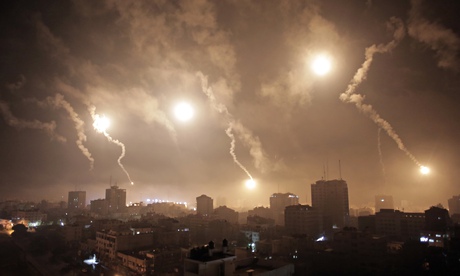Gaza needs the world’s help
The Gaza strip is now unlivable. For the sake of humanity, the international community must require Israel to end this disaster

international community seems unable to halt what is an apocalypse for
Gaza’s citizens.’ Photograph: Khalil Hamra/AP
To continue to witness children being killed and orphaned, entire
families being obliterated and entire neighbourhoods levelled, is
beginning to seem physically impossible. No one should have to bear this
burden. And yet we in Gaza are being forced to do so. Even those who
have sought refuge in apparently protected spaces – such as schools run by the UN – have fallen victim.
Against
this backdrop, it is difficult to comprehend how the international
community seems unable to halt what is no longer just a war in Gaza but
an apocalypse for its citizens. The Gaza Strip is now unlivable.
Hundreds of thousands of people who lived close to the perimeter of the
territory have been pushed towards its centre. One of the most densely
populated districts in the world has not only shrunk but become more
dense. Since Gaza’s only electricity generation station was targeted, severe shortages in water and now bread have been exacerbated.
The
government of Israel does not seem interested in a ceasefire pact. As
recent history amply demonstrates, the ideal next step in Israel’s eyes
would be a conclusion of this war without having to engage in any kind
of binding agreements with Gaza. It has extended the conflict by making
any cessation of hostilities dependent on the destruction of tunnels
which lead into Israel, a condition it did not state at the outset.
Putting aside the question of whether it was legitimate for Palestinians
to dig those tunnels, Israel should not be allowed to cripple prospects
for a ceasefire with a requirement that even it has acknowledged will
be difficult to achieve.
And what is surely not acceptable
any longer is Israel’s continued denial of the reasons those tunnels
were resorted to in the first place. Its refusal to address the issue of
Gaza as a political question and not as a military one is part of the
problem, and the reason for so many civilian deaths.
An explicit
recognition by the international community that the conditions civilians
are enduring in Gaza are insupportable would boost the prospect of a
credible ceasefire. Palestinians would take such recognition as a clear
gesture of fairness and goodwill from the world. But, if some aspects of
Gaza’s troubles are recognised while others are sidelined – such as the
need for a longer term solution – the feeling that the world is still
unwilling to appreciate our plight will only be deepened.
Global
support and recognition would create space for Palestinians to trust a
ceasefire that not only silences the guns but which also recognises the
legitimacy of Gaza’s rights. To state the case unmistakably, these are
the rights to economic development; free movement and access; an
acknowledgment of the inseparability of Gaza and the West Bank and,
critically, a commitment to shield ordinary people from the effects of
political strife. The active participation of the US, EU and UN as
partners and guarantors of an agreement and as empowered monitors of any
breaches in its implementation, would be essential. Gaza will also need
an immediate and a massive rescue plan, financed and resourced by the
Arab world. The people of Gaza must then be given an unimpeded
opportunity to develop their own economy and to begin to rely on their
own resources.
In short, the international community’s inability
to require Israel to end the disaster must change. The case for this is
no longer one of politics or military strategy. It is an urgent
humanitarian one. It would not be anti-Israel to take these steps.
Rather, it would be pro-global: a move to protect human ideals which may
one day triumph in genuine resolution and lasting peace.

No comments:
Post a Comment